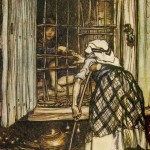I am cautiously optimistic for Baz Luhrmann’s adaptation of The Great Gatsby, though, like pretty much everyone, I have some hugely unsettled and queasy feelings each time I watch the trailer below:
The modern music is jarring, and the dancing looks lewd. But I think that might be all to the good. It’s hard to manage vulgarity when it occurs in a period piece. Flapper dresses are so much prettier and more embellished than my jeans and a t-shirt that it’s hard to remember that, in their day, they rankled.
“The past is a foreign country. They do things differently there.” And that makes it really hard for us to adjust our expectations of social norms and spot when people are transgressing them (deliberately or inadvertently). So, filmmakers usually have to cheat.
Either they can use the camera to draw our attention to the offending behavior (a camera pans across a group of ladies sitting with skirts neatly covering their shoes until it comes to rest on a pair of visible ankles — panning up to reveal our tradition-bucking protagonist). Or they can just telegraph the violation by exaggerating the horrified reaction of all the proper people in the room (tightly knitted eyebrows, audible gasps, etc), even though the magnitude of the reaction is at least as inappropriate as the initial provocation.
Luhrmann’s Gatsby seems to be taking a different approach. Instead of sticking tightly to period authenticity, he’s going for accuracy of tone. The jarring music, the modern fast cuts make us feel uncomfortable and as though the whole thing is a little gaudy. Which seems like an appropriate reaction to the ostentatious, new money Jay Gatsby.
This kind of deliberate discomfort is among the many reasons why I enjoyed the emo-rock musical Bloody Bloody Andrew Jackson. The opening lines of the show are: “I’m wearing some tight, tight jeans, and tonight we’re delving into some serious, serious shit. I’m Andrew Jackson, and I’m your president. a-ONE, TWO, THREE, FOUR! (The song below comes immediately afterward)
It would be nearly impossible to induce an audience to have a visceral reaction to some of the things that actually offended about Andrew Jackson. If we watch a man in a suit deliver a campaign speech to a crowd, we’re not going to be seized with a sense of impropriety, but that kind of populist behavior was scandalous at the time. The show matches how unpresidential and undignified Jackson seems, and has to alter the actions to maintain the same level of revulsion. (The musical also amps up his immaturity, so it’s not exactly a straight portrait).
These artists are running up against the problem that C.S. Lewis discussed in Mere Christianity, where modesty is a pretty universal virtue, but the particular forms it takes vary across cultures and times. Using the forms of vulgarity or lewdness can make the historical transgressions viscerally accessible, but there’s one other clever solution, deployed in Tom Stoppard’s adaptation of Anna Karenina.
Instead of exaggerating the deviation, he hyper-stylizes the norm. The film had a dance captain for plenty of non-dance scenes, so the formal city culture of Imperial Russia plays out in a very choreographed, precise way. That way, you can see when someone goes wrong because they miss a step. The violation doesn’t mimic modern lewdness, and it doesn’t require the rest of the participants in the scene to exaggerate their reactions, but this misstep is still jarring.












